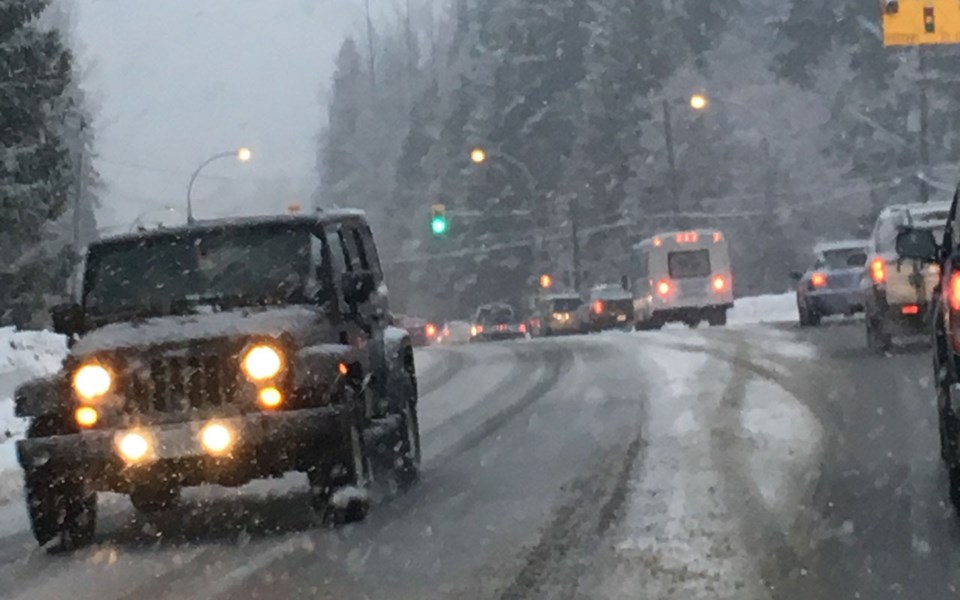With another winter of hefty snowfall, the conversation has started up again — should the Sea to Sky Highway be designated winter-tire only?
"I think from our perspective, having the proper winter-tire, mountain highway designation is actually really appropriate for this corridor," said Squamish Mayor Patricia Heintzman.
"I think the M+S, it just doesn't cut it in colder temperatures, and also in the type of snow events and winter events that we have here, all along the corridor."
Since 2014, passenger vehicles on the Sea to Sky Highway have required either mountain/snowflake (snow tires) or mud and snow (M+S) tires from Oct. 1 to March 31.
The issue was discussed at a recent meeting of mayors in the Sea to Sky, said Whistler Mayor Nancy Wilhelm-Morden.
"I don't know what the other towns and cities are going to do, but certainly Whistler is not going to be advocating for universal snow tires," Wilhelm-Morden said, adding that what the municipality would like to see is more proactive enforcement on tires from the RCMP.
"So if we know a big storm is coming in we want the RCMP up doing the tire checks before the storm arrives, and similarly if it's a long weekend or some other time when we know that there's going to be heavy usage, we want to have the police in place doing the tire checks," she said.
The Resort Municipality of Whistler has also been working with Tourism Whistler to "get the message out" that visitors really don't need a car in Whistler — they can shuttle from the airport and walk or use transit when they arrive, Wilhelm-Morden said.
"(The province has) been very resistant to go to a full requirement for snow tires, just because it would be really quite costly for everybody — for rental car agencies, for residents and so on," she said.
The question of proper tires on rental cars has also come up in Whistler this winter, with some rentals making it up the highway in summer tires.
Of the three rental car companies operating out of YVR Pique reached out to, only one responded before deadline.
"Our entire British Columbia rental fleet across our Hertz, Dollar and Thrifty brands is equipped with All Season tires (those with M+S symbols), meeting local safety requirements," wrote Hertz communications manager Lauren Luster, in an emailed statement.
A portion of the fleet is equipped with proper winter tires, available on request, Luster said.
"Our employees will recommend winter tires as an added advantage for winter driving conditions," she said, adding that "the vast majority" of their vehicles also have electronic stability control.
Ensuring only vehicles with proper tires make it up the Sea to Sky, then, is a matter of policy.
"I know I've had friends and family come and try to rent a car in the city — they force you to pay a huge premium if you want to actually have winter tires on a rental car," Heintzman said.
"So these types of things have to be mandated from the provincial government, otherwise industry just won't react."
For MLA Jordan Sturdy, the call for action would need to come from local governments in the corridor, as it would be the local residents who are most impacted by any added costs.
"If there is good evidence that that makes sense, because of some sort of safety assessment, then I am certainly happy to pursue that," Sturdy said, adding that he has been trying to get accident stats from ICBC, but found when the RCMP fill out its list of "contributing factors" for each accident, whether the tires involved are winter or M+S is not noted.
There are also a vast number of variables that can contribute to any given accident, making a blanket policy difficult, he said.
"I think it's important that we do understand what the contributing factors are, and that it would be very useful to understand if tires and tire designations or inappropriate tires or whatever are contributing factors or not," Sturdy said.
"I think it's important to collect that information, and I'll be advocating for that."
The province encourages drivers to get the best tires they can, and recommends mountain/snowflake tires for people who regularly travel the corridor.
"For those that can adjust travel times to more favourable conditions, an M+S tire is a viable and safe option, and meets the Rubber Manufacturers Association (RMA) and Rubber Association of Canada (RAC) all-season tire definition," reads an emailed statement from the Ministry of Transportation and Infrastructure.
In all cases, winter tires must be in good condition with a minimum tread depth of 3.5 mm. The fine for driving without the proper tires is $121, and $109 for driving without the proper tread depth.




